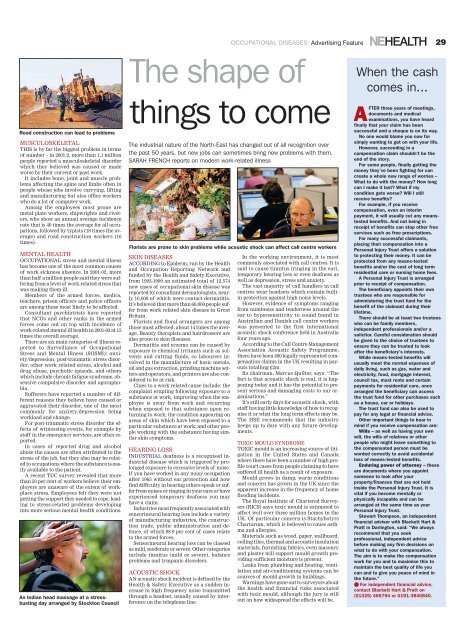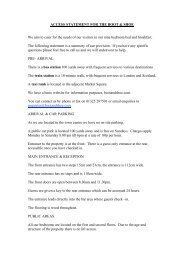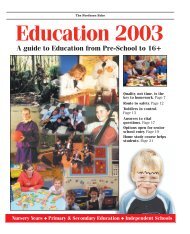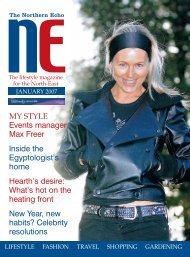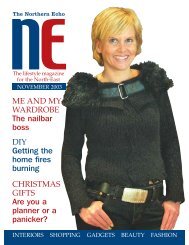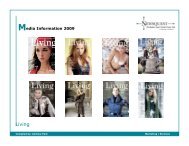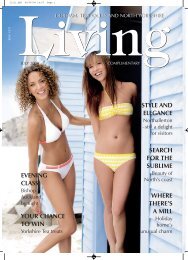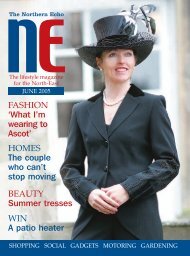SPORTS INJURY How to tackle it EXERCISE The power of Pilates ...
SPORTS INJURY How to tackle it EXERCISE The power of Pilates ...
SPORTS INJURY How to tackle it EXERCISE The power of Pilates ...
- No tags were found...
Create successful ePaper yourself
Turn your PDF publications into a flip-book with our unique Google optimized e-Paper software.
OCCUPATIONAL DISEASES: Advertising FeatureN E HEALTH29Road construction can lead <strong>to</strong> problemsMUSCULOSKELETALTHIS is by far the biggest problem in terms<strong>of</strong> number – in 2001/2, more than 1.1 millionpeople reported a musculoskeletal disorderwhich they believed was caused or madeworse by their current or past work.It includes bone, joint and muscle problemsaffecting the spine and limbs <strong>of</strong>ten inpeople whose jobs involve carrying, liftingand manufacturing but also <strong>of</strong>fice workerswho do a lot <strong>of</strong> computer work.Among the employees most prone aremetal plate workers, shipwrights and riveters,who show an annual average incidencerate that is 40 times the average for all occupations,followed by typists (18 times the average)and road construction workers (16times).MENTAL HEALTHOCCUPATIONAL stress and mental illnesshas become one <strong>of</strong> the most common causes<strong>of</strong> work sickness absence. In 2001-02, morethan half a million people said they were sufferingfrom a level <strong>of</strong> work-related stress thatwas making them ill.Members <strong>of</strong> the armed forces, medics,teachers, prison <strong>of</strong>ficers and police <strong>of</strong>ficersare among those most likely <strong>to</strong> be affected.Consultant psychiatrists have reportedthat NCOs and other ranks in the armedforces come out on <strong>to</strong>p w<strong>it</strong>h incidence <strong>of</strong>work-related mental ill health in 2001-03 at 15times the overall average.<strong>The</strong>re are six main categories <strong>of</strong> illness reported<strong>to</strong> Surveillance <strong>of</strong> OccupationalStress and Mental Illness (SOSMI): anxiety/depression,post-traumatic stress disorder,other work related stress, alcohol anddrug abuse, psychotic episode, and otherswhich include chronic fatigue syndrome, obsessivecompulsive disorder and agoraphobia.Sufferers have reported a number <strong>of</strong> differentreasons they believe have caused oraggravated their disorder, one <strong>of</strong> the mostcommonly for anxiety/depression beingworkload and change.For post-traumatic stress disorder the effects<strong>of</strong> w<strong>it</strong>nessing events, for example bystaff in the emergency services, are <strong>of</strong>ten reported.In cases <strong>of</strong> reported drug and alcoholabuse the causes are <strong>of</strong>ten attributed <strong>to</strong> thestress <strong>of</strong> the job, but they also may be related<strong>to</strong> occupations where the substance is easilyavailable <strong>to</strong> the patient.A recent TUC survey revealed that morethan 50 per cent <strong>of</strong> workers believe their employersare unaware <strong>of</strong> the extent <strong>of</strong> workplacestress. Employees felt they were notgetting the support they needed <strong>to</strong> cope, leading<strong>to</strong> stress-related problems developingin<strong>to</strong> more serious mental health cond<strong>it</strong>ions.An Indian head massage at a stressbustingday arranged by S<strong>to</strong>ck<strong>to</strong>n Council<strong>The</strong> shape <strong>of</strong>things <strong>to</strong> come<strong>The</strong> industrial nature <strong>of</strong> the North-East has changed out <strong>of</strong> all recogn<strong>it</strong>ion overthe past 50 years, but new jobs can sometimes bring new problems w<strong>it</strong>h them.SARAH FRENCH reports on modern work-related illnessFlorists are prone <strong>to</strong> skin problems while acoustic shock can affect call centre workersSKIN DISEASESACCORDING <strong>to</strong> Epiderm, run by the Healthand Occupation Reporting Network andfunded by the Health and Safety Executive,from 1993-1999 an estimated <strong>to</strong>tal <strong>of</strong> 12,574new cases <strong>of</strong> occupational skin disease wasreported by consultant derma<strong>to</strong>logists, nearly10,000 <strong>of</strong> which were contact dermat<strong>it</strong>is.It’s believed that more than 60,000 people sufferfrom work related skin disease in GreatBr<strong>it</strong>ain.Florists and floral arrangers are amongthose most affected, about 14 times the average.Beauty therapists and hairdressers arealso prone <strong>to</strong> skin diseases.Dermat<strong>it</strong>is and eczema can be caused byexposure <strong>to</strong> chemical irr<strong>it</strong>ants such as solventsand cutting fluids, so labourers involvedin the manufacture <strong>of</strong> basic metals,oil and gas extraction, grinding machine settersand opera<strong>to</strong>rs, and printers are also considered<strong>to</strong> be at risk.Clues <strong>to</strong> a work related cause include: thecomplaint erupting following exposure <strong>to</strong> asubstance at work, improving when the employeeis away from work and recurringwhen exposed <strong>to</strong> that substance upon returning<strong>to</strong> work; the cond<strong>it</strong>ion appearing onareas <strong>of</strong> skin which have been exposed <strong>to</strong> aparticular substance at work; and other peopleworking w<strong>it</strong>h the substance having similarskin symp<strong>to</strong>ms.HEARING LOSSINDUSTRIAL deafness is a recognised industrialdisease which is triggered by prolongedexposure <strong>to</strong> excessive levels <strong>of</strong> noise.If you have worked in any noisy occupationafter 1963 w<strong>it</strong>hout ear protection and nowfind difficulty in hearing others speak or sufferfrom noises or ringing in your ears or haveexperienced temporary deafness you mayhave a claim.Industries most frequently associated w<strong>it</strong>hsensorineural hearing loss include a variety<strong>of</strong> manufacturing industries, the constructiontrade, public administration and defence,<strong>of</strong> which 88.9 per cent <strong>of</strong> cases relate<strong>to</strong> the armed forces.Sensorineural hearing loss can be classedas mild, moderate or severe. Other categoriesinclude tinn<strong>it</strong>us (mild or severe), balanceproblems and tympanic disorders.ACOUSTIC SHOCKAN acoustic shock incident is defined by theHealth & Safety Executive as a sudden increasein high frequency noise transm<strong>it</strong>tedthrough a headset, usually caused by interferenceon the telephone line.In the working environment, <strong>it</strong> is mostcommonly associated w<strong>it</strong>h call centres. It issaid <strong>to</strong> cause tinn<strong>it</strong>us (ringing in the ear),temporary hearing loss or even deafness aswell as depression, stress and anxiety.<strong>The</strong> vast major<strong>it</strong>y <strong>of</strong> call handlers in callcentres wear headsets which contain builtinprotection against high noise levels.<strong>How</strong>ever, evidence <strong>of</strong> symp<strong>to</strong>ms rangingfrom numbness and tenderness around theear <strong>to</strong> hypersens<strong>it</strong>iv<strong>it</strong>y <strong>to</strong> sound found inAustralian and Danish call centre workerswas presented <strong>to</strong> the first internationalacoustic shock conference held in Australiafour years ago.According <strong>to</strong> the Call Centre ManagementAssociation Acoustic Safety Programme,there have been 400 legally represented compensationclaims in the UK resulting in payouts<strong>to</strong>talling £2m.Its chairman, Marcus Quilter, says: “<strong>The</strong>fact is that acoustic shock is real, <strong>it</strong> is happening<strong>to</strong>day and <strong>it</strong> has the potential <strong>to</strong> presentserious and damaging costs <strong>to</strong> our organisations.”It’s still early days for acoustic shock, w<strong>it</strong>hstaff having l<strong>it</strong>tle knowledge <strong>of</strong> how <strong>to</strong> recognise<strong>it</strong> or what the long term effects may be.<strong>The</strong> HSE recommends that the industrykeeps up <strong>to</strong> date w<strong>it</strong>h any future developments.TOXIC MOULD SYNDROMETOXIC mould is an increasing source <strong>of</strong> l<strong>it</strong>igationin the Un<strong>it</strong>ed States and Canadawhere there have been a number <strong>of</strong> high pr<strong>of</strong>ilecourt cases from people claiming <strong>to</strong> havesuffered ill health as a result <strong>of</strong> exposure.Mould grows in damp, warm cond<strong>it</strong>ionsand concern has grown in the UK since theapparent increase in the frequency <strong>of</strong> homeflooding incidents.<strong>The</strong> Royal Inst<strong>it</strong>ute <strong>of</strong> Chartered Surveyors(RICS) says <strong>to</strong>xic mould is estimated <strong>to</strong>affect well over three million homes in theUK. Of particular concern is StachybotyrsChartarum, which is believed <strong>to</strong> cause asthmaand allergies.Materials such as wood, paper, wallboard,ceiling tiles, thermal and acoustic insulationmaterials, furnishing fabrics, even masonryand plaster will support mould growth providingsufficient moisture is present.Leaks from plumbing and heating, ventilationand air-cond<strong>it</strong>ioning systems can besources <strong>of</strong> mould growth in buildings.Warnings have gone out <strong>to</strong> surveyors aboutthe health and financial risks associatedw<strong>it</strong>h <strong>to</strong>xic mould, although the jury is stillout on how widespread the effects will be.When the cashcomes in...AFTER three years <strong>of</strong> meetings,documents and medicalexaminations, you have heardfinally that your claim has beensuccessful and a cheque is on <strong>it</strong>s way.No one would blame you now forsimply wanting <strong>to</strong> get on w<strong>it</strong>h your life.<strong>How</strong>ever, succeeding in acompensation claim shouldn’t be theend <strong>of</strong> the s<strong>to</strong>ry.For some people, finally getting themoney they’ve been fighting for cancreate a whole new range <strong>of</strong> worries –What <strong>to</strong> do w<strong>it</strong>h the money? <strong>How</strong> longcan I make <strong>it</strong> last? What if mycond<strong>it</strong>ion gets worse? Will I stillreceive benef<strong>it</strong>s?For example, if you receivecompensation, even an interimpayment, <strong>it</strong> will usually cut any meanstestedbenef<strong>it</strong>s. And not being inreceipt <strong>of</strong> benef<strong>it</strong>s can s<strong>to</strong>p other freeservices such as free prescriptions.For many successful claimants,placing their compensation in<strong>to</strong> aPersonal Injury Trust <strong>of</strong>fers a solution<strong>to</strong> protecting their money. It can beprotected from any means-testedbenef<strong>it</strong>s and/or the cost <strong>of</strong> long termresidential care or nursing home fees.A Personal Injury Trust is arrangedprior <strong>to</strong> receipt <strong>of</strong> compensation.<strong>The</strong> beneficiary appoints their owntrustees who are responsible foradministering the trust fund for thebenef<strong>it</strong> <strong>of</strong> the claimant during theirlifetime.<strong>The</strong>re should be at least two trusteeswho can be family members,independent pr<strong>of</strong>essionals and/or asolici<strong>to</strong>r. Careful consideration shouldbe given <strong>to</strong> the choice <strong>of</strong> trustees <strong>to</strong>ensure they can be trusted <strong>to</strong> lookafter the beneficiary’s interests.While means-tested benef<strong>it</strong>s willusually meet the normal expenses <strong>of</strong>daily living, such as gas, water andelectric<strong>it</strong>y, food, mortgage interest,council tax, most rents and certainpayments for residential care, oncearranged the beneficiary can accessthe trust fund for other purchases suchas a house, car or holidays.<strong>The</strong> trust fund can also be used <strong>to</strong>pay for any legal or financial advice.Other important things <strong>to</strong> bear inmind if you receive compensation are:Wills – as well as having your ownwill, the wills <strong>of</strong> relatives or otherpeople who might leave something <strong>to</strong>the compensated person must beworded correctly <strong>to</strong> avoid accidentalloss <strong>of</strong> means-tested benef<strong>it</strong>s.Enduring <strong>power</strong> <strong>of</strong> at<strong>to</strong>rney – theseare documents where you appointsomeone <strong>to</strong> look after yourproperty/finances that are not heldinside the Personal Injury Trust. It isv<strong>it</strong>al if you become mentally orphysically incapable and can bearranged at the same time as yourPersonal Injury Trust.Stewart Thompson, an independentfinancial adviser w<strong>it</strong>h Blackett Hart &Pratt in Darling<strong>to</strong>n, said: “We alwaysrecommend that you seekpr<strong>of</strong>essional, independent advicebefore making any firm decisions onwhat <strong>to</strong> do w<strong>it</strong>h your compensation.<strong>The</strong> aim is <strong>to</strong> make the compensationwork for you and <strong>to</strong> maximise this <strong>to</strong>maintain the best qual<strong>it</strong>y <strong>of</strong> life youcan and <strong>to</strong> give you peace <strong>of</strong> mind inthe future.”● For independent financial advice,contact Blackett Hart & Pratt on(01325) 466794 or 0191-3840840.


